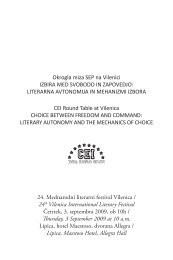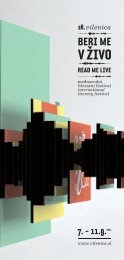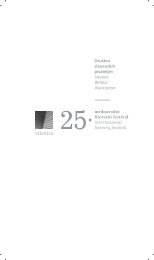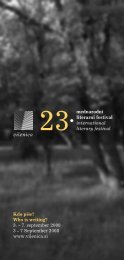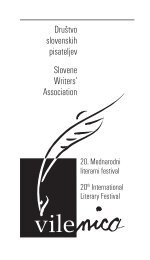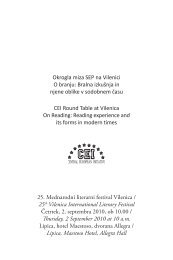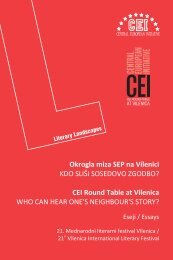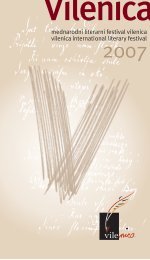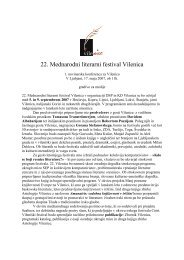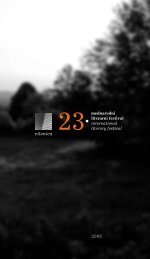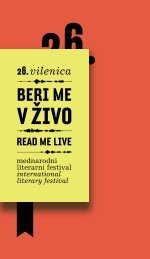Publikacija SEP 2011 - Vilenica
Publikacija SEP 2011 - Vilenica
Publikacija SEP 2011 - Vilenica
Create successful ePaper yourself
Turn your PDF publications into a flip-book with our unique Google optimized e-Paper software.
the mind has no discernable limits. In the libraries of stone and glass,<br />
however, in those storerooms of the memory of society, space is always<br />
lacking, and in spite of bureaucratic restraint, reasoned selection, lack<br />
of funds and willful or accidental destruction, there is never enough<br />
room for the books we wish to keep. To remedy this constraint, thanks<br />
to our technical skills, we have set up virtual libraries for whom space<br />
approaches infinity. But even these electronic arks cannot rescue for<br />
posterity more than certain forms of the text itself. In those ghostly<br />
libraries, the concrete incarnation of the text is left behind, and the<br />
flesh of the word has no existence.<br />
Virtual libraries have their advantages, but that does not mean that<br />
solid libraries are no longer needed, however hard the electronic industry<br />
may try to convince us of the contrary, however hard Google and<br />
its brethren may present themselves as philantropical entities and not<br />
as exploiters of our intellectual patrimony. The World Digital Library,<br />
an international library supported both by Unesco and by the U.S.<br />
Library of Congress, the Bibliothèque de France, and other national<br />
libraries, is a colossal and important undertaking, and even though<br />
part of the funding comes from Google, it is (for the time being) free<br />
from commercial concerns. However, even when such remarkable virtual<br />
libraries are being built, traditional libraries are still of the essence.<br />
An electronic text is one thing, the identical text in a printed book is<br />
another, and they are not interchangeable, any more than a recorded<br />
line can replace a line embedded in an individual memory. Context,<br />
material support, the physical history and experience of a text are part<br />
of the text, as much as its vocabulary and its music. In the most literal<br />
sense, matter is not immaterial.<br />
And the problems of traditional libraries – biased selection and subjective<br />
labeling, hierarchical cataloguing and its implied censorship, archival<br />
and circulating duties – continue to be, in any society that deems<br />
itself literate, essential problems. The library of the mind is haunted by<br />
the knowledge of all the books we’ll never read and will therefore never<br />
rightfully call ours; the collective memorial libraries are haunted by all<br />
the books that never made it into the circle of the librarians’ elect: books<br />
rejected, abandoned, restricted, despised, forbidden, unloved, ignored.<br />
68



